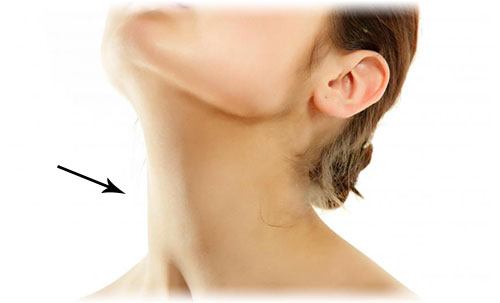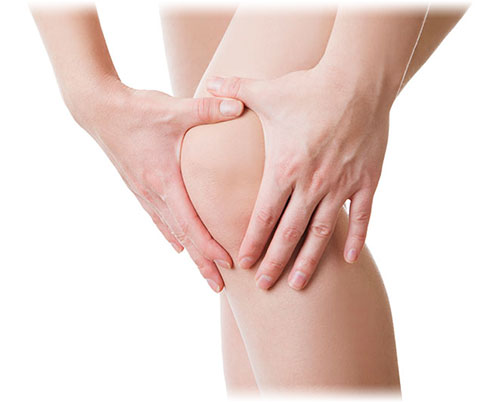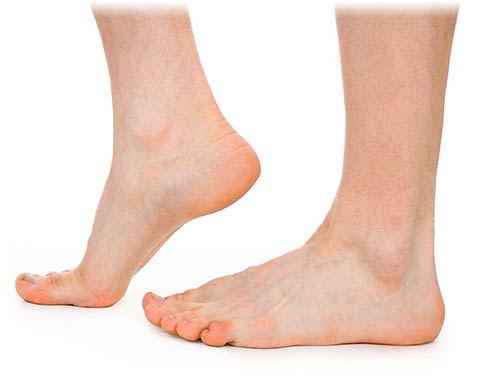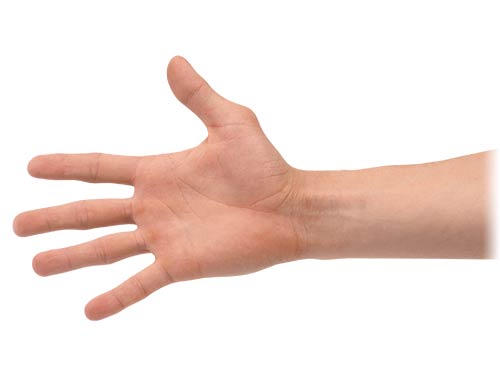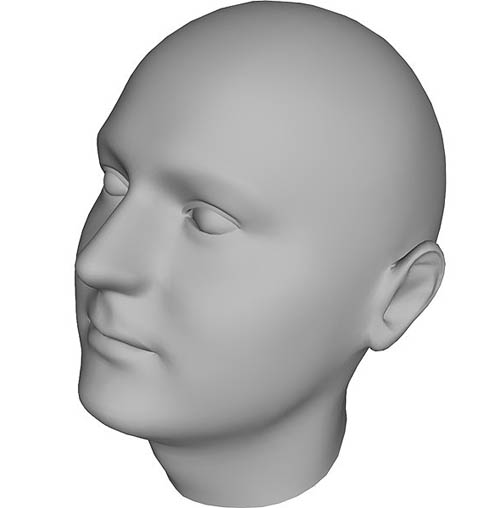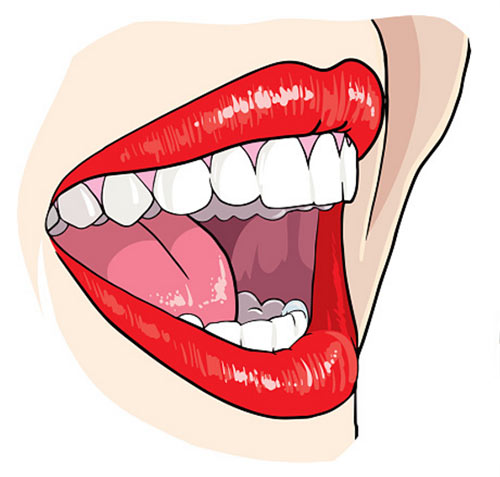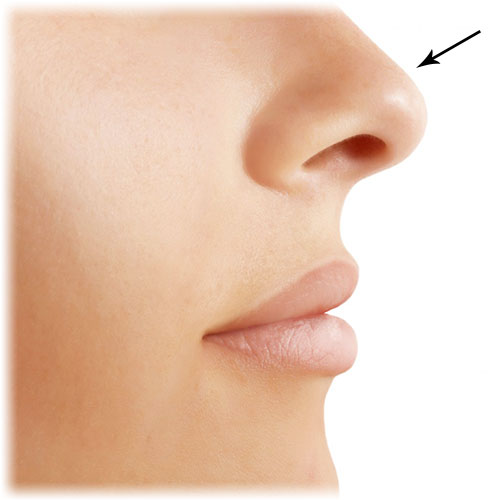arm
He was carrying a heavy load on his right shoulder.
Either of the two long parts of the upper body that are fixed to the shoulders and have the hands at the end
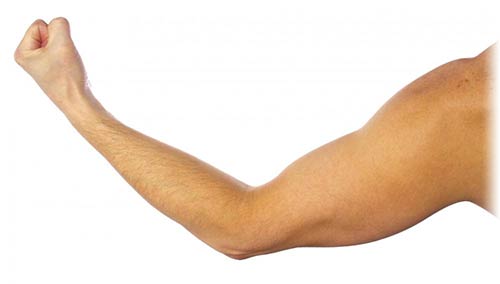
He had a tattoo on his left arm.
Oxford Essential Dictionary
arm
noun
the part of your body from your shoulder to your hand:
Put your arms in the air.
He was carrying a book under his arm.
arm in arm with your arm holding another person's arm:
The two friends walked arm in arm.
Longman Dictionary of Contemporary English
arm
I. arm1 S1 W1 /ɑːm $ ɑːrm/ BrE AmE noun [countable]
[Sense 1, 3-4, 6-13: Language: Old English; Origin: earm]
[Sense 2,5,14: Date: 1100-1200; Language: Old French; Origin: armes (plural), from Latin arma]
1. BODY one of the two long parts of your body between your shoulders and your hands:
Dave has a broken arm.
left/right arm
He had a tattoo on his left arm.
Tim’s mother put her arms around him.
Pat was carrying a box under his arm.
He had a pile of books in his arms.
They walked along the beach arm in arm (=with their arms bent around each other’s).
take somebody by the arm (=lead someone somewhere by holding their arm)
She took him by the arm and pushed him out of the door.
take somebody in your arms (=gently hold someone with your arms)
Gerry took Fiona in his arms and kissed her.
cross/fold your arms (=bend your arms so that they are resting on top of each other against your body)
He folded his arms and leaned back in his chair.
The old lady rushed to greet him, arms outstretched.
2. WEAPONS arms [plural] weapons used for fighting wars:
Sales of arms to the Middle East have dramatically increased.
nuclear arms
the arms trade
an arms dealer
The government is cutting arms expenditure.
The United Nations will lift its arms embargo against the country.
take up arms (against somebody) (=get weapons and fight)
Boys as young as 13 are taking up arms to defend the city.
He appealed for the rebels to lay down their arms (=stop fighting).
under arms (=with weapons and ready to fight)
All available forces are under arms. ⇨ small arms at ↑small1(15)
3. 
FURNITURE the part of a chair, ↑sofa etc that you rest your arms on
4. CLOTHING the part of a piece of clothing that covers your arm SYN sleeve
5. be up in arms to be very angry and ready to argue or fight:
Residents are up in arms about plans for a new road along the beach.
6. with open arms if you do something with open arms, you show that you are happy to see someone or eager to accept an idea, plan etc:
We welcomed Henry’s offer with open arms.
My new in-laws accepted me with open arms.
7. somebody would give their right arm to do something used to say that someone would be willing to do anything to get or do something because they want it very much:
I’d give my right arm to be 21 again.
8. hold something at arm’s length to hold something away from your body
9. keep/hold somebody at arm’s length to avoid developing a relationship with someone:
Petra keeps all men at arm’s length to avoid getting hurt.
10. as long as your arm informal a list or written document that is as long as your arm is very long:
I’ve got a list of things to do as long as your arm.
11. PART OF GROUP a part of a large group that is responsible for a particular type of activity:
the political arm of a terrorist organization
Epson America is the US marketing arm of a Japanese company.
12. OBJECT/MACHINE a long part of an object or piece of equipment:
the arm of a record player
There is a 15-foot arm supporting the antenna.
13. on sb’s arm old-fashioned if a man has a woman on his arm, she is walking beside him holding his arm
14. DESIGN arms [plural] a set of pictures or patterns, usually painted on a ↑shield, that is used as the special sign of a family, town, university etc SYN coat of arms
⇨ arms akimbo at ↑akimbo(1), ⇨ babe in arms at ↑babe(1), ⇨ brothers in arms at ↑brother1(6), ⇨ cost an arm and a leg at ↑cost2(1), ⇨ fold somebody/something in your arms at ↑fold1(7), ⇨ twist sb’s arm at ↑twist1(9)
• • •
COLLOCATIONS
■ adjectives
▪ sb’s left/right arm She broke her left arm in a riding accident.
▪ broken/fractured He was taken to hospital with a broken arm.
▪ strong a muscular man with strong arms
▪ bare (=not covered by clothes) She wore no stockings and her arms were bare.
■ verbs
▪ wave your arms (=to attract attention) The man was waving his arms and shouting something.
▪ raise your arm Stand with your feet apart and your arms raised above your head.
▪ fold/cross your arms (=bend both arms in front of your body) He folded his arms across his chest and waited.
▪ stretch/hold out your arms I dreamt I saw my mother again with her arms stretched out towards me.
▪ grab sb’s arm (=take hold of it with a sudden violent movement) ‘Wait’, he cried, grabbing her arm.
▪ put/wrap your arms around somebody I put my arms around Bobby and gave him a hug.
▪ take/hold somebody in your arms (=gently put your arms around someone you love) He took her in his arms and kissed her.
▪ take somebody by the arm (=lead someone somewhere holding their arm) ‘It’s this way’ he said, taking me by the arm.
■ phrases
▪ arm in arm (=with your arm linked to someone else’s arm) There were several young couples, walking arm in arm.
▪ with arms akimbo (=with your hands on your hips so that your elbows point away from your body) Anna stood with arms akimbo, ready to challenge me.
▪ with outstretched arms Manuel came forward with outstretched arms to welcome Magda.
Oxford Advanced Learner's Dictionary
arm
arm [arm arms armed arming] noun, verb [ɑːm] [ɑːrm]
noun
see also arms
PART OF BODY
1. either of the two long parts that stick out from the top of the body and connect the shoulders to the hands
• He escaped with only a broken arm.
• She threw her arms around his neck.
• The officer grabbed him by the arm (= grabbed his arm).
• She touched him gently on the arm.
• He held the dirty rag at arm's length (= as far away from his body as possible).
• They walked along arm in arm (= with the arm of one person linked with the arm of the other).
• She cradled the child in her arms.
• They fell asleep in each other's arms (= holding each other).
• He was carrying a number of files under his arm (= between his arm and his body).
• He walked in with a tall blonde on his arm (= next to him and holding his arm).
OF CLOTHING
2. the part of a piece of clothing that covers the arm
Syn: sleeve
• The arms will need shortening.
OF CHAIR
3. the part of a chair, etc. on which you rest your arms
• She perched on the arm of his chair.
OF MACHINERY
4. a long narrow part of an object or a piece of machinery, especially one that moves
• a robotic arm
OF WATER/LAND
5. a long narrow piece of water or land that is joined to a larger area
• A small bridge spans the arm of the river.
OF ORGANIZATION
6. usually singular ~ (of sth) a section of a large organization that deals with one particular activity
Syn: wing
• the research arm of the company
more at (with) arms akimbo at akimbo, a babe in arms at babe, bear arms at bear v., chance your arm at chance v., fold sb in your armsfold your arms at fold v., as long as your armthe long arm of sth at long adj., with open arms at open adj., give your right arm for sth/to do sth at right adj., a shot in the arm at shot n., twist sb's arm at twist v.
Word Origin:
n. Old English arm earm Germanic Dutch arm German Arm
v. Middle English Old French armer Latin armare arma ‘armour, arms’
Collocations:
Physical appearance
A person may be described as having:
Eyes
(bright) blue/green/(dark/light) brown/hazel eyes
deep-set/sunken/bulging/protruding eyes
small/beady/sparkling/twinkling/(informal) shifty eyes
piercing/penetrating/steely eyes
bloodshot/watery/puffy eyes
bushy/thick/dark/raised/arched eyebrows
long/dark/thick/curly/false eyelashes/lashes
Face
a flat/bulbous/pointed/sharp/snub nose
a straight/a hooked/a Roman/(formal) an aquiline nose
full/thick/thin/pouty lips
dry/chapped/cracked lips
flushed/rosy/red/ruddy/pale cheeks
soft/chubby/sunken cheeks
white/perfect/crooked/protruding teeth
a large/high/broad/wide/sloping forehead
a strong/weak/pointed/double chin
a long/full/bushy/wispy/goatee beard
a long/thin/bushy/droopy/handlebar/pencil moustache/ (especially US) mustache
Hair and skin
pale/fair/olive/dark/tanned skin
dry/oily/smooth/rough/leathery/wrinkled skin
a dark/pale/light/sallow/ruddy/olive/swarthy/clear complexion
deep/fine/little/facial wrinkles
blonde/blond/fair/(light/dark) brown/(jet-)black/auburn/red/(BrE) ginger/grey hair
straight/curly/wavy/frizzy/spiky hair
thick/thin/fine/bushy/thinning hair
dyed/bleached/soft/silky/dry/greasy/shiny hair
long/short/shoulder-length/cropped hair
a bald/balding/shaved head
a receding hairline
a bald patch/spot
a side/centre/(US) center (BrE) parting/ (NAmE) part
Body
a long/short/thick/slender/(disapproving) scrawny neck
broad/narrow/sloping/rounded/hunched shoulders
a bare/broad/muscular/small/large chest
a flat/swollen/bulging stomach
a small/tiny/narrow/slim/slender/28-inch waist
big/wide/narrow/slim hips
a straight/bent/arched/broad/hairy back
thin/slender/muscular arms
big/large/small/manicured/calloused/gloved hands
long/short/fat/slender/delicate/bony fingers
long/muscular/hairy/shapely/(both informal, often disapproving) skinny/spindly legs
muscular/chubby/(informal, disapproving) flabby thighs
big/little/small/dainty/wide/narrow/bare feet
a good/a slim/a slender/an hourglass figure
be of slim/medium/average/large/athletic/stocky build
Example Bank:
• He held out his arms with a broad smile.
• He held the dirty rag at arm's length.
• He placed a comforting arm around her shoulder.
• He pulled her into his arms and kissed her.
• He put an arm around her shoulders.
• He ran towards her and flung his arms around her.
• He stood there with crossed arms, looking angry.
• He used his good arm to support his weight.
• He walked in with a tall blonde on his arm.
• He was running forward, waving his arms.
• Her arms tightened convulsively around the child.
• Her arms were resting on the table.
• His arm hung awkwardly against his side.
• His arms clutched his stomach.
• His arms slid around her.
• I have a sore arm, so I'm afraid I can't help you.
• Kris collapsed into her mother's waiting arms.
• Lucy felt the warm sun on her bare arms.
• She carried the dog under one arm.
• She ducked his flailing arms.
• She folded her arms and stared at him.
• She lay curled up in the crook of his arm.
• She moved closer to her father and took his arm.
• She stood looking at him with arms akimbo.
• The child lay in its mother's arms.
• The couple linked arms and set off along the beach.
• The figure in the boat raised an arm.
• The officer grabbed him by the arm.
• They fell asleep in each other's arms.
• They walked along arm in arm
• They're sure to welcome you with open arms.
• the muscles of the upper arm
• The bank plans to sell part of its US finance arm.
• The report was published by the research arm of the Department of Transport.
Idioms: keep somebody at arm's length ▪ pay an arm and a leg
Cambridge Advanced Learner's Dictionary
Cambridge Advanced Learner's Dictionary - 4th Edition
arm / ɑːm / / ɑːrm / noun (BODY PART)
arm in arm
A1 [ C ] either of the two long parts of the upper body that are fixed to the shoulders and have the hands at the end:
My arms ache from carrying this bag.
She put/threw her arms round me and gave me a hug.
He took/held her in his arms (= held her closely) .
Bill arrived at the party with his new girlfriend on his arm (= her hand resting on his arm) .
See picture arm
See picture body
C2 [ C ] The arm of a piece of clothing or furniture is a part of it that you put your arm in or on:
the arm of a jacket
the arm of a chair
See picture arm
arm in arm C2 When two people are arm in arm, they both have one arm bent at the elbow and passing around and supporting, or being supported by, the arm of the other person:
We walked arm in arm along the river bank.
arm / ɑːm / / ɑːrm / noun (BODY PART)
arm in arm
A1 [ C ] either of the two long parts of the upper body that are fixed to the shoulders and have the hands at the end:
My arms ache from carrying this bag.
She put/threw her arms round me and gave me a hug.
He took/held her in his arms (= held her closely) .
Bill arrived at the party with his new girlfriend on his arm (= her hand resting on his arm) .
See picture arm
See picture body
C2 [ C ] The arm of a piece of clothing or furniture is a part of it that you put your arm in or on:
the arm of a jacket
the arm of a chair
See picture arm
arm in arm C2 When two people are arm in arm, they both have one arm bent at the elbow and passing around and supporting, or being supported by, the arm of the other person:
We walked arm in arm along the river bank.
arm / ɑːm / / ɑːrm / noun [ C ] (OF LAND/WATER)
An arm of land or water is a long, thin part of it that is joined to a larger area.
arm / ɑːm / / ɑːrm / noun [ C ] (OF ORGANIZATION)
An arm of an organization is a part of it that is responsible for a particular activity or place:
The British company is one arm of a large multinational.
© Cambridge University Press 2013
Collins COBUILD Advanced Learner’s English Dictionary
arm
I. PART OF YOUR BODY OR OF SOMETHING ELSE
/ɑ:(r)m/
(arms)
Frequency: The word is one of the 700 most common words in English.
1.
Your arms are the two long parts of your body that are attached to your shoulders and that have your hands at the end.
She stretched her arms out...
He had a large parcel under his left arm.
N-COUNT
2.
The arm of a piece of clothing is the part of it that covers your arm.
= sleeve
N-COUNT
3.
The arm of a chair is the part on which you rest your arm when you are sitting down.
N-COUNT
4.
An arm of an object is a long thin part of it that sticks out from the main part.
...the lever arm of the machine.
...the arms of the doctor’s spectacles.
N-COUNT: usu N of n
5.
An arm of land or water is a long thin area of it that is joined to a broader area.
At the end of the other arm of Cardigan Bay is Bardsey Island.
N-COUNT: usu N of n
6.
An arm of an organization is a section of it that operates in a particular country or that deals with a particular activity.
Millicom Holdings is the British arm of an American company.
= wing
N-COUNT: usu sing, usu N of n
7.
If two people are walking arm in arm, they are walking together with their arms linked.
He walked from the court arm in arm with his wife.
PHRASE: usu v PHR, oft PHR with n
8.
If you say that something costs an arm and a leg, you mean that it is very expensive. (INFORMAL)
A week at a health farm can cost an arm and a leg.
PHRASE: PHR after v
9.
If you hold something at arm’s length, you hold it away from your body with your arm straight.
He struck a match, and held it at arm’s length.
PHRASE: usu PHR after v
10.
If you keep someone at arm’s length, you avoid becoming too friendly or involved with them.
She had always kept his family at arm’s length.
PHRASE: V inflects
11.
If you welcome some action or change with open arms, you are very pleased about it. If you welcome a person with open arms, you are very pleased about their arrival.
They would no doubt welcome the action with open arms...
PHRASE: PHR after v [approval]
12.
If you twist someone’s arm, you persuade them to do something. (INFORMAL)
She had twisted his arm to get him to invite her.
PHRASE: V and N inflect
II. WEAPONS
/ɑ:(r)m/
(arms, arming, armed)
Frequency: The word is one of the 700 most common words in English.
1.
Arms are weapons, especially bombs and guns. (FORMAL)
The IRA had extensive supplies of arms.
...arms control.
N-PLURAL: oft N n
2.
If you arm someone with a weapon, you provide them with a weapon.
She’d been so terrified that she had armed herself with a loaded rifle...
Arming the police doesn’t deter crime.
VERB: V n with n, V n
3.
If you arm someone with something that will be useful in a particular situation, you provide them with it.
She thought that if she armed herself with all the knowledge she could gather she could handle anything...
VERB: V n with n
4.
The arms of a city or of a noble family are its coat of arms. Arms is often used in the names of British pubs.
...china painted with the arms of Philippe V.
...his local pub, the Abercorn Arms.
N-PLURAL
5.
see also armed, -armed, coat of arms, comrade-in-arms, small arms
6.
A person’s right to bear arms is their right to own and use guns, as a means of defence.
PHRASE: V inflects
7.
If soldiers lay down their arms, they stop fighting and give up their weapons. (OLD-FASHIONED)
PHRASE: V inflects
8.
If one group or country takes up arms against another, they prepare to attack and fight them.
They threatened to take up arms against the government if their demands were not met.
PHRASE: V inflects, oft PHR against n
9.
If people are up in arms about something, they are very angry about it and are protesting strongly against it.
Environmental groups are up in arms about plans to sink an oil well close to Hadrian’s Wall.
PHRASE: usu v-link PHR
Merriam-Webster's Advanced Learner's Dictionary
2arm noun, pl arms
1 [count] : a gun or other weapon that is used especially in a war - usually plural
• The government was selling arms to other countries.
• the right of individuals to carry/bear arms [=firearms]
- often used before another noun
• an arms agreement/deal
• arms shipments
• The United Nations lifted the arms embargo against the country.
- see also arms race, firearm, small arms
2 arms [plural] : coat of arms
• the royal arms of Portugal
call to arms
✦A call to arms is a request or command to become ready to fight.
• The government issued a call to arms. The phrase is also used for something that tries to make people fight for a cause.
• Her book is a political call to arms.
in arms
✦If someone is your brother/sister/comrade in arms, that person has helped you fight an enemy especially in a war.
• He and I were brothers in arms. [=we fought in a war together]
lay down your arms : to put down your weapons and stop fighting
• The soldiers refused to lay down their arms.
present arms military
- used as a command to hold your rifle so that it points straight up in front of you as a sign of respect;
take up arms : to pick up weapons and become ready to fight
• They took up arms to defend their city.
• The rebels are taking up arms against their own government.
under arms : serving in the military
• the number of Americans now under arms around the world
up in arms : angry and ready to fight or argue
• Voters were up in arms over the new taxes.
- compare 1arm
1arm /ˈɑɚm/ noun, pl arms [count]
1 : either one of the two long body parts that join the top of your body at the shoulder and that end at the hand or wrist
• He has big, strong, muscular arms.
• She broke her left arm. = Her left arm was/got broken.
• He hurt his throwing/pitching arm [=the arm that he uses to throw/pitch a ball] in the last game.
• She put/threw her arms around him. [=she hugged him]
• She had a newspaper tucked under her arm.
• He was carrying a bag of groceries in each arm.
• He gave/offered his arm to her, and she took it. [=she held onto his arm]
• She grabbed my arm. = She grabbed me by the arm.
• He was standing there with his arms crossed/folded.
• She stood with her arms outstretched. = She stood with her arms wide open.
• She sat cradling the baby in her arms.
• I've known her since she was a babe in arms. [=a baby who is too young to walk and has to be held]
• He took her in/into his arms [=he embraced her] and kissed her passionately.
• She found him in the arms of [=being embraced by] another woman.
• He showed up at the party with a young woman on his arm. [=holding his arm]
• He took her (by the) arm and they walked in to dinner.
- see picture at human
2 : the part of a piece of clothing (such as a shirt or coat) that covers the arm : sleeve
• The jacket's arms are too tight. = The jacket is too tight in the arms.
3 : a part of a piece of furniture (such as a chair or couch) that gives support for a person's arm
• the arm of the sofa
- see also 1armchair
4 a : a long thin piece that is connected to the main part of a machine, structure, etc., and that looks or moves like a human arm
• the robot's mechanical arm
• the machine's robotic arm
• the arm of the record player
b : a long and narrow area of water
• an arm of the sea
5 : the part of a group or organization that performs a specific job or function - usually singular
• the organization's political arm [=the part of the organization that deals with politics]
• It is the most powerful arm [=division] of the organization.
• the military arm of the government
6 US sports : a person's ability to throw a ball - usually singular
• Their pitcher's got a great arm.
• a strong/weak arm
an arm and a leg informal : a very large amount of money
• It's a reliable car, and it doesn't cost an arm and a leg. [=it isn't too expensive]
arm in arm : next to each other with the arm of one person linked at the elbow to the arm of another person
• an elderly couple walking down the street arm in arm
a shot in the arm
- see 1shot
as long as someone's arm
- see 1long
at arm's length : from a distance that is the length of a person's arm
• It's best to view the painting at arm's length.
• holding a candle at arm's length
✦To keep someone or something at arm's length is to avoid being very close to or friendly with someone or something.
• Since going to college, he has kept his old friends at arm's length.
• They no longer trust her and are keeping her at arm's length.
• The government has kept the group at arm's length until now.
chance your arm
- see 2chance
give your right arm
- see 1give
the long arm of the law : the ability of the police to find and catch people who commit crimes
• The long arm of the law finally caught up with him [=the police caught him] 30 years later.
• So far, she's been able to escape the long arm of the law.
twist someone's arm
- see 1twist
with open arms : in a very kind and friendly way
• We were welcomed back with open arms.

